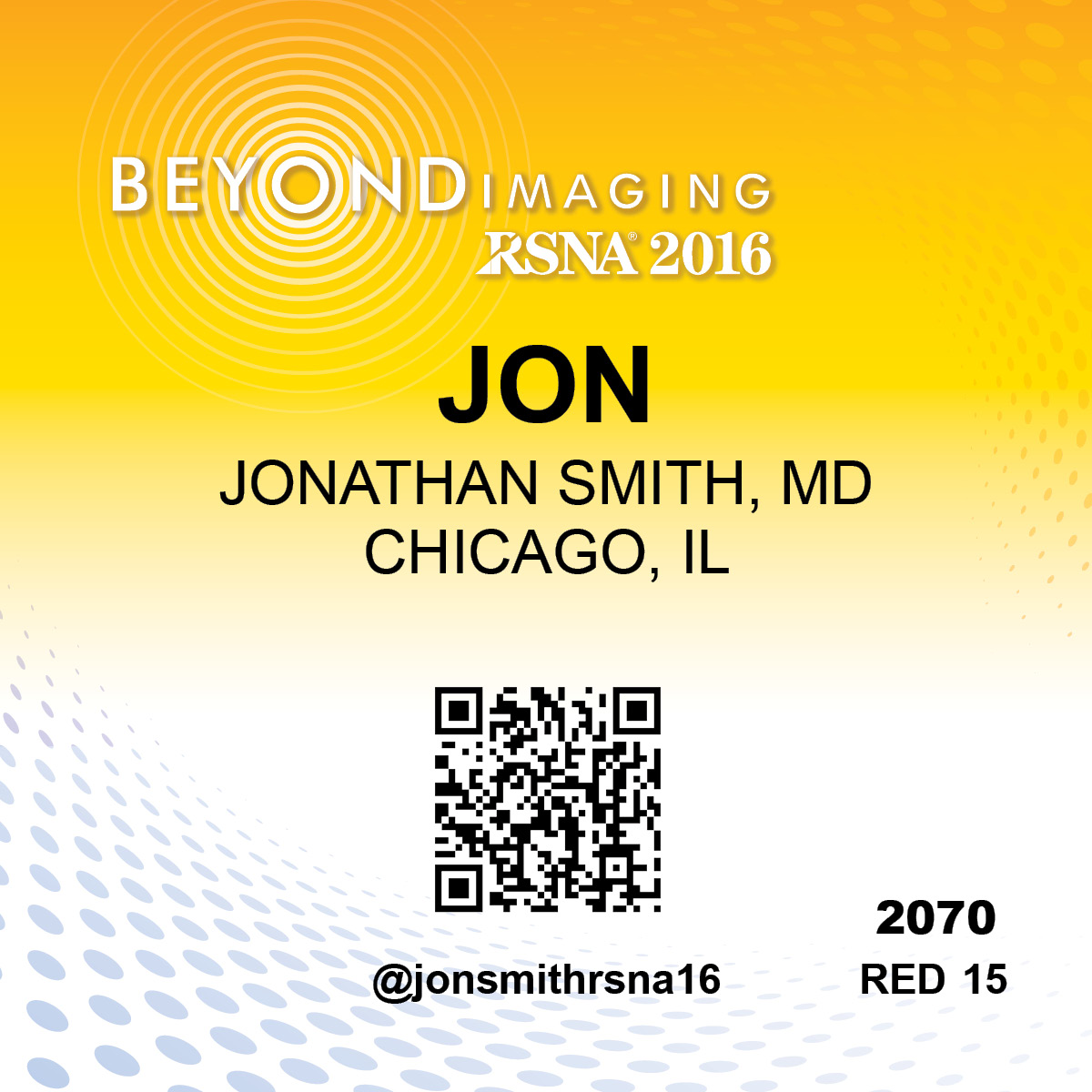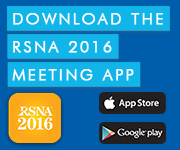RSNA 2016 Sessions Go Beyond Imaging to Move Radiology Forward
Monday, Nov. 28, 2016
In this new area of radiology and healthcare, radiologists are being asked to go beyond imaging to gain a broader perspective on every facet of the patient experience.

Richard L. Baron
Radiologists must actively collaborate with referring physicians, stay abreast of advancing subspecialty knowledge, be part of the digital revolution and stay at the forefront of clinical imaging research, said 2016 RSNA President Richard L. Baron, MD, in the President's Address Sunday at the Arie Crown Theater.
"Now more than ever the radiology community needs to reflect on our culture and practices and seek new clinical and research approaches. It is time we look beyond imaging to see new ways to move the specialty forward," Dr. Baron said.
This year's RSNA Meeting Program offers a vast array of sessions designed to empower attendees seeking to embrace the future of radiology from every angle. Below is a sampling.
RCC25 (Educational Course)
How to Create a Culture of Continuous Quality Improvement Using Existing and Free Resources
Monday 4:30-6:00 p.m. | Room: S501ABC
Learn how to empower lead performance, interpretation and system improvements and create a culture of continuous quality improvement using existing or available free resources.
SPS122 (Special Interest Session)
Special Interest Session: A New Model of Patient Care: Value over Volume-a RAD Talk
Monday 4:30-6:00 p.m. | Room: E353B
Along with discussing RSNA's Radiology Cares: The Art of Patient-centered Practice and ACR's Imaging 3.0 campaigns, presenters will discuss how to assess the radiology practice model and realign it to focus on value over volume as well as tactics to put the concepts of patient-centeredness and value vs. volume into practice.
RC317 (Educational Course)
Emerging Technology: PET/MRI – Opportunities and Challenges
Tuesday 8:30-10:00 a.m. | Room: S504CD
Subsessions include PET/MRI: The Evolving Field of Structure and Function and PET/MRI Physics: The Opportunities and Challenges.
RC354 (Educational Course)
Preparing Your Radiology Practice and IT Department for Big Data
Tuesday 8:30-10:00 a.m. | Room: S404AB
The session focuses on big data approaches to radiology and the importance of developing a comprehensive IT architecture and capability beyond the EMR in order to effectively use big data tools.
RC307 (Educational Course)
Predicting Outcomes for Genitourinary Malignancies: Role of Radiomics in Clinical Practice
Tuesday 8:30-10:00 a.m. | Room: S405AB
Presenters review the histopathologic and genetic heterogeneity of bladder cancer and how these differences translate importantly to clinical practice. Attendees will learn how tumor features assessed using MR techniques such as DWI and DCE imaging, correlate with clinical and pathogenetic features of bladder cancers such as tumor aggressiveness, stage, histopathologic phenotype, immunohistochemical biomarkers response to chemotherapy and disease specific survival.
SSG07-06 (Educational Course)
Radiology Report Terminology: Interpretive Differences between Patients and Radiologists
Tuesday 11:20-11:30 a.m. | Room: S402AB
RSNA Student Travel Stipend Award
Presenters discuss research demonstrating that patients' perceptions of terminology within the radiology report are not synonymous with those of radiologists and that these differences could lead to confusion and dissatisfaction.
MSRT41 (Educational Course)
ASRT@RSNA 2016: A Team Approach to Patient-centered Imaging
Wednesday 8:00-9:00 a.m. | Room: N230B
The session focuses on the demonstrated value of establishing a multidisciplinary team to enhance patient satisfaction in imaging.
RC527 (Educational Course)
Academic and Community Practice Integration: Challenges and Strategies for Success
Wednesday 8:30-10:00 a.m. | Room: S104A
There is increasingly blurring distinction between academic and community radiology practices. Presenters discuss the challenges of running successful hybrid academic-community practice and highlight the unique advantages of academic subspecialty radiology groups in providing quality service for the community.
HP230-SD-WEA5 (Educational Course)
Teaching Radiologists Who Perform Image Guided Interventions Effective Communication Skills through Simulation
Wednesday 12:15-12:45 p.m. | HP Community, Learning Center Station #5
Presenters that discuss workshops that teach radiologists' effective communication skills may increase radiologists' comfort communicating with patients during image guided procedures.
SSM02-03 (Educational Course)
Impact of Second-Opinion Review of Breast Imaging at
a Cancer Center: Is It
Worthwhile?
Wednesday 3:20-3:30 p.m. | Room: E451B
RSNA Student Travel Stipend Award
Presenters discuss research showing that second-opinion review of outside breast imaging has a significant impact on surgical management and is a worthwhile utilization of resources and valuable for patient care.
RC627 (Educational Course)
Radiology in a New Payment Model Environment
Thursday 8:30-10:00 a.m. | Room: S404AB
Presenters will discuss the "current state" of Radiology but will also focus on future reimbursement trends that will define our subspecialty for the next 10 years.
SSQ10-01 (Educational Course)
Informatics Keynote Speaker: Using Imaging Informatics to Improve Quality and Safety in the Era of Value-Based Care
Thursday 10:30-10:40 a.m. | Room: S403A
RC732C (Educational Course)
Mentoring in the Culture of Multigenerational Workforce and Diversity
Thursday 4:30-6:00 p.m. | RC732C | Room: S502AB
Understand how mentor-mentee relationship and expectations are changing in the current environment of multigenerational workforce and diversity. Learn what leadership skills are needed to become good mentors. Understand what to do and what not to do when you are looking for a mentor.
VI001-EB-X
Entrepreneurship in
Interventional Radiology
All Day | VI Community, Learning Center
This exhibit covers the technological advances, miniaturized instruments and high tech imaging which have led to advancements in minimally invasive techniques; reducing risk to patients and improving clinical outcomes. Researchers discuss strategies for choosing a commercialization approach and identifying a market need and funding and financing a startup.
MK258-ED-X (Educational Exhibit)
Musculoskeletal System Imaging-Guided Percutaneous Biopsies: Update and Systematic Comprehensive Review
All Day | MK Community, Learning Center
Presenters discuss the multidisciplinary approach to musculoskeletal system imaging-guided percutaneous biopsies, whereby the radiologist works closely with the clinicians/pathologist to maximize the possibility of definitive diagnosis while minimizing potential complications.
NR22-1-ED-X (Educational Exhibit)
Looking through the Surgical Lens: A Radiologist's Guide to Understanding Surgical Landmarks and Advances in Head and Cancer Therapy
All Day | NR Community, Learning Center
This exhibit covers important surgical landmarks that are crucial for planning head and neck cancer surgery so that these can be incorporated into radiology reports. Advances in oncologic surgery including robotics and the role imaging plays in determining surgical options are included.




 Home
Home Program
Program Exhibitors
Exhibitors My Meeting
My Meeting
 Virtual
Virtual Digital Posters
Digital Posters Case of Day
Case of Day

